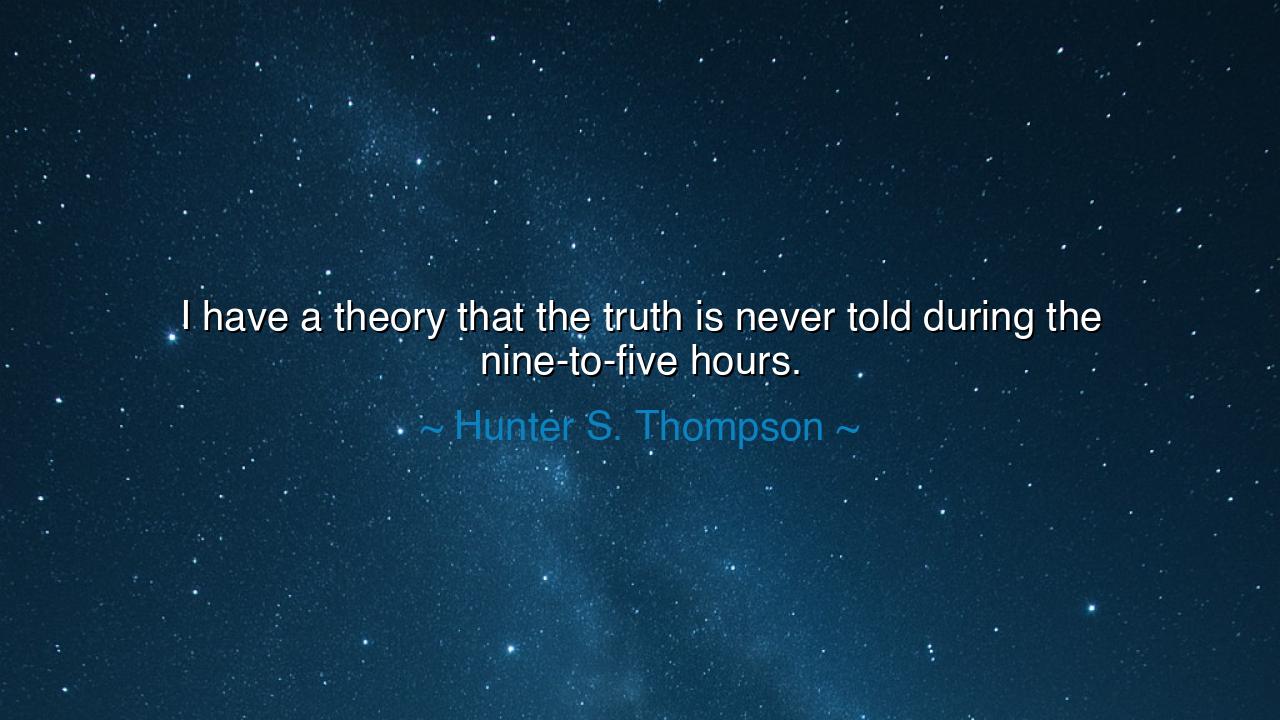
I have a theory that the truth is never told during the






Hunter S. Thompson, prophet of the wild and chronicler of the American spirit, once said: “I have a theory that the truth is never told during the nine-to-five hours.” These words, sharp as a blade and laced with irony, strike at the very heart of modern existence. The nine-to-five is the world of business suits, polite conversations, structured schedules, and carefully managed appearances. It is the time when masks are worn, when men and women perform roles assigned to them, when language is bent to serve profit, order, and survival. But the truth, Thompson declares, does not live in that daylight theater. It comes out after hours—raw, untamed, unpolished, when the masks slip and the soul dares to speak.
For the truth is not polite. It is not marketable. It does not fit neatly into the rhythm of office hours or the decorum of boardrooms. During the nine-to-five, words are measured, crafted for diplomacy, restrained by the fear of consequence. But when night descends, when the day’s labor is done, when people gather not as employees but as human beings, then the truth emerges. Over late-night conversations, in moments of exhaustion, in laughter, in sorrow, in confession—the soul finds courage to utter what daylight silenced.
We see this in history. Think of Winston Churchill during the dark nights of the Second World War. By day, he performed his role as statesman, measuring his words to keep hope alive. But in the long hours after, in letters and private reflections, he confessed the despair and terror that haunted him. The official speeches were necessary, yes, but the truth of his humanity was revealed only in those midnight confessions. Thus Thompson’s words hold: the truest speech often happens outside the public stage, when duty and performance have been set aside.
Or recall the 1960s, when the voices of counterculture—poets, musicians, and dreamers—rose up against the neat, orderly lies of the corporate day. The nine-to-five world preached conformity, obedience, and progress. But the truth of war, injustice, and longing for freedom erupted not in offices but in smoky bars, in underground clubs, in midnight rallies. Bob Dylan’s songs, Allen Ginsberg’s verses, Thompson’s own writings—all emerged outside the rigid hours of industry. They carried the honesty that daylight repressed.
The meaning of Thompson’s words, then, is not merely cynical; it is liberating. He calls us to recognize that truth is not always found in official reports, workplace conversations, or the polished words of authority. It is often whispered in secret, sung in rebellion, or confessed in weakness. To seek truth, one must look beyond the hours of labor and the rituals of order, into the places where the human spirit breathes unchained.
The lesson is profound: do not mistake professionalism for authenticity. Do not believe that what is spoken in meetings, in reports, in carefully curated hours is the full story. Seek out the unguarded moments, the after-hours honesty, the words that slip out when fear is gone. Be a listener in those moments, for they carry the voice of the soul. And in your own life, dare to live with such honesty that your truth is not silenced by the clock.
Practically, this means carving out spaces in your life where masks can fall. Share your true thoughts with trusted friends, not only your polished opinions. Write in journals, sing, create, speak unfiltered. Listen not only to the official voices of society, but to the artists, the rebels, the dreamers who dare to speak outside the boundaries. In these places, you will find the truth that the nine-to-five world tries to bury.
So remember Thompson’s wisdom: “The truth is never told during the nine-to-five hours.” It is told in whispers, in laughter, in sorrow, in poetry, in rebellion. It is found not in the fluorescent glow of the office, but in the midnight fire of the human heart. Seek it there, and you will live not as a performer of roles, but as one awakened to what is real.






CNCute Na
This quote resonates with the idea that true expression often happens outside the confines of traditional work hours. But why does Thompson believe truth can’t be told during the nine-to-five hours? Is it because societal expectations or the structure of work stifles raw honesty? Or could it be that during those hours, we are more focused on roles and responsibilities than on personal revelations? How might we reclaim the truth in our daily routines?
HMPhan Hoan My
Thompson’s view makes me think about how the 'truth' might be harder to access in environments that prioritize efficiency and conformity, like the nine-to-five workday. Are we so caught up in tasks and obligations that we overlook deeper truths about ourselves or society? Is there a disconnect between the personal truths we experience outside of work and the expectations placed on us during work hours? How do we reconcile the two?
TLPham Thuy Lam
I find Thompson’s idea of truth being absent during the nine-to-five hours both provocative and somewhat unsettling. Could it be that in our structured work lives, we suppress our most honest selves? Is this what fuels the frustration many feel about the monotony of office life—this inability to speak or live truthfully? What would it take to bring more honesty into these everyday moments, especially when we're expected to conform?
ATAnh Trang
Thompson’s perspective is striking—suggesting that truth eludes us during the conventional nine-to-five work hours. It makes me question how much of our daily lives are spent in a state of routine or conformity, where truth is suppressed or ignored. Could it be that during these structured hours, we’re too focused on productivity or meeting expectations to actually see or express the truth? What would happen if we lived more authentically during these hours?